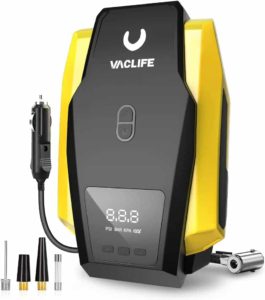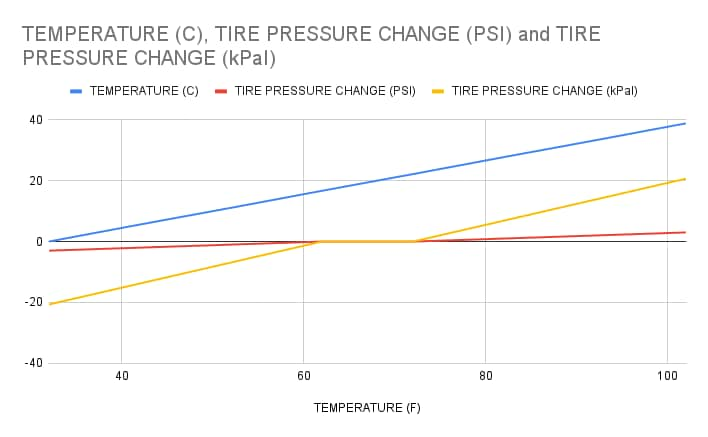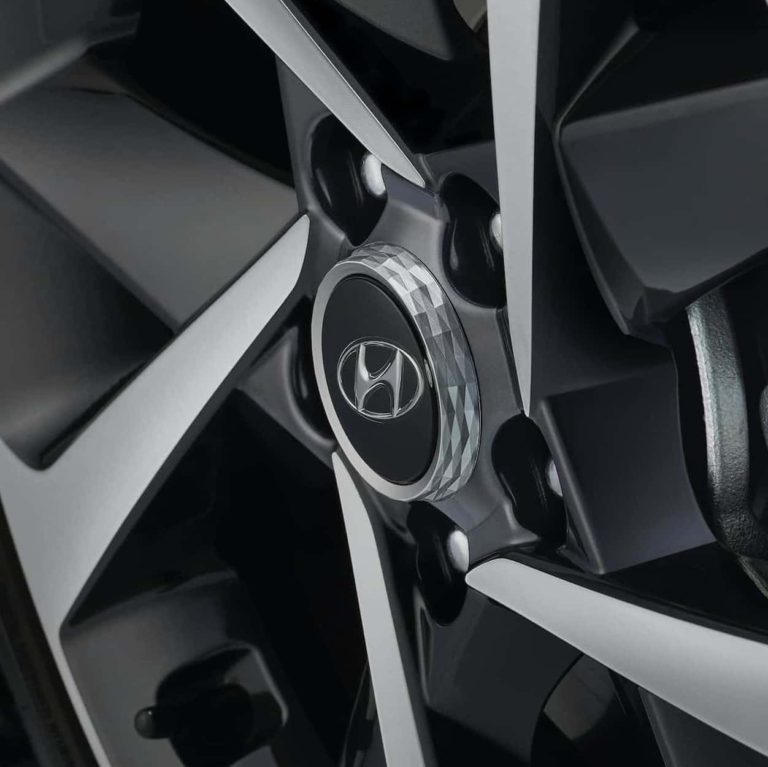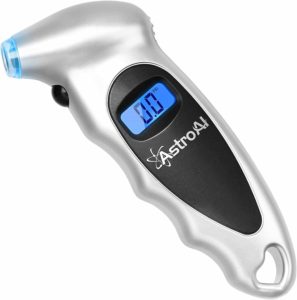Steps to Reset Hyundai Accent Tire Pressure Light
Step 1: Check and Adjust Your Tire Pressure
The newer Hyundai models like the Accent don’t have tire pressure reset buttons, so it’s important to know how to turn off your tire pressure light. Inflate all 4 tires to the recommended 33 Psi. Only change the tire pressure when the tires are cold (before driving or after your Accent has been parked for a few hours).
2022 Hyundai Accent Tire Pressure
Tire Size | FRONT PSI | REAR PSI |
185/65 R15 | 33 | 33 |
205/45 R17 | 33 | 33 |
SPARE TIRE | 60 | 60 |
Step 2: Drive the Car
Once you set your tire pressures to 33 Psi, start driving. Hyundai advises driving for a minimum of 3 minutes at 20 mph or faster. The tire pressure light will turn off after you drive the car.
Step 3: Re-check your Tire Pressure
If the tire pressure light doesn’t go off after step 1 and step 2, recheck your tire pressure. Confirm that the pressure is still at exactly 33 Psi. If it’s not, you likely have a tire leak or some sort of puncture. If the tire light goes off and then comes back on, you definitely have a tire leak.
Hyundai Accent TPMS Malfunction Indicator
Your car has a special warning light for when the tire pressure monitoring system (TPMS) isn’t working, called a TPMS malfunction indicator. This malfunction indicator uses the same dashboard light as the low pressure indicator. If there’s a problem, the yellow tire light will blink for about a minute and then stay on. This will happen every time you start the car until the issue is fixed. When this warning light is on, the system won’t be able to tell you if your tire pressure is low. Basically, your tire pressure monitoring system won’t work correctly until the problem with the TPMS is resolved. Usually this will happen when you have a dead or dying pressure sensor. In other words, if you have a blinking tire pressure light, you have a problem with the TPMS system itself, not an air pressure problem. To determine which tire sensor is the problem, you will need a TPMS diagnostic tool like this Autel TPMS tool.
When to Reset Your Hyundai Accent TPMS:
After your tire pressure has been adjusted.
After a pressure sensor has been serviced or replaced.
After a tire rotation has been performed.
After tire balances or wheel alignments.
After any tire or wheel has been replaced.
After when the vehicle battery dies, been drained, or jumped.
After the TPMS light turns on.
How Does the Hyundai Accent TPMS Work?
Pressure Sensors in Each Tire: Each tire has its own pressure sensor that continuously monitors the air pressure inside the tire.
Data Transfer: These sensors transmit live real time tire pressure information wirelessly to the car’s onboard computer.
Sensor Battery Life: The pressure sensors use batteries similar to those in wristwatches, they usually last between 5 and 7 years.
Vehicle Startup: Everytime you start your car the TPMS starts automatically collecting data from the tire pressure sensors.
Continuous monitoring: The system continually checks the tire pressure, making sure it stays within the suggested range.
Warning thresholds: The TPMS has predefined pressure limits for each tire, based on Hyundai’s guidelines.
Pressure Changes: If tire pressure goes beyond the established thresholds (either too high or too low), the TPMS sets off a warning. Usually it’s around 10-15% to set off the tire light.
Warning light activation: When there’s an issue with your tire pressure, the yellow exclamation point warning light on your dashboard will light up to let you know there’s a problem.
Error codes: If you scan each pressure sensor with a TPMS diagnostic tool when you have a blinking tire pressure light it will give you error codes detailing the issue with whatever sensor is the problem.
What Causes the Hyundai Accent Tire Pressure Light to Turn On?
Low tire pressure: The most common cause is if one or more tires have pressure below the recommended level, the TPMS light will turn on.
Rapid pressure loss: A sudden drop in tire pressure, like getting a nail or screw puncture, will trigger the TPMS light.
High tire pressure: Overinflated tires can also cause the TPMS light to come on.
Sensor malfunction: A faulty or damaged tire pressure sensor will result in the TPMS light flashing.
Sensor battery depletion: If the sensor’s battery is drained, the TPMS malfunction light will turn on. This will also make the tire light flash.
System malfunction: Issues with the TPMS itself, such as communication problems or software glitches, can cause the light to illuminate. Again, this will cause the tire light to flash.
Seasonal temperature changes: Extreme temperature fluctuations will affect tire pressure and trigger the TPMS light.
After tire service: The TPMS light will turn on if the system was not reset properly after tire rotation, repair, or replacement.
How Does the Weather Affect Your Tire Pressure?
The chart shows how air temperature affects tire pressure in both Fahrenheit and Celsius, and in PSI and kPa units. It explains that when it gets colder, tire pressure goes down, and when it gets warmer, tire pressure goes up. The normal temperature to check tire pressure is about 62°F (16.7°C), where your tire pressure won’t change. In simple terms, for every 10-degree drop in temperature, tire pressure goes down by about 1 PSI.
What are the Benefits of the Hyundai Accent TPMS?
Improved safety: The TPMS in the Hyundai Accent helps ensure your tires are at the right pressure, reducing the risk of accidents due to underinflated or overinflated tires.
Better fuel economy: Maintaining correct tire pressure can improve gas mileage, as properly inflated tires create less rolling resistance.
Longer tire life: Correct tire pressure helps prevent uneven wear and tear, extending the lifespan of your tires.
Enhanced performance: Proper tire pressure allows your Hyundai Accent to handle and brake more efficiently, providing a smoother, more responsive driving experience. This can also extend the life of your brake pads and rotors.
Environmental benefits: Well-maintained tire pressure can reduce CO2 emissions, as it contributes to better fuel efficiency.
Reduced tire-related costs: By preventing premature tire wear and increasing fuel efficiency, the TPMS can save you money in the long run.
Early warning system: The TPMS alerts you to potential tire issues before they become critical, allowing you to address problems before they lead to a flat tire or blowout.
Peace of mind: Knowing that the TPMS is constantly monitoring your tire pressure can help you feel more confident and secure while driving your Hyundai Accent.
Please note that this blog post contains Amazon affiliate links. This means that if you make a purchase through one of these links, we at TPMSRESET.com may earn a small commission at no extra cost to you. We only recommend products that we personally use and believe in. Thank you for supporting us.





